Understanding the Impact of Behavioral Health on Aging Nutrition
As individuals age, maintaining proper nutrition becomes increasingly complex, influenced by a multitude of behavioral, psychological, and social factors. Behavioral health issues such as depression, anxiety, dementia, and psychological distress profoundly affect appetite and nutritional intake, often leading to malnutrition, weight loss, and declining health. This article examines how mental health and associated psychosocial factors influence eating behaviors in older adults, emphasizing the importance of holistic approaches to promote better health and well-being in this vulnerable population.
The Influence of Behavioral and Mental Health Disorders on Nutrition in Older Adults
How does behavioral health impact nutrition and appetite in older adults?
Behavioral health conditions such as depression, anxiety, and cognitive decline have a profound effect on the eating habits of older adults. Depression is quite prevalent in this population, with studies indicating that around 84% of elderly individuals display symptoms of depression, which is strongly linked to malnutrition. Depression can reduce motivation to eat, impair appetite, and cause a loss of interest in food, leading to significant weight loss and nutrient deficiencies.
Similarly, anxiety and other mood disorders can interfere with normal eating patterns, often resulting in irregular meals or decreased food intake. Cognitive decline, including conditions like dementia, also disrupts normal eating behaviors. As memory loss progresses, many seniors forget to eat, have difficulty recognizing food, or experience physical problems like trouble swallowing.
Data from multiple studies reveal that malnutrition rates are alarmingly high among cognitively impaired elderly—up to 96.7% in severe cases—highlighting how mental health directly influences nutritional status. Factors such as living without a caregiver, residing in institutions, and advanced age tend to elevate the risk of poor nutrition. Conversely, protective factors include higher education levels and living in familiar environments like one's home.
In summary, mental health issues are not just psychological concerns but key determinants of nutritional health in older adults. Addressing these psychosocial challenges through comprehensive healthcare and social support is vital for maintaining proper nutrition, preventing weight loss, and improving overall quality of life in this vulnerable group.
Psychological and Biological Factors Shaping Eating Behaviors in Seniors
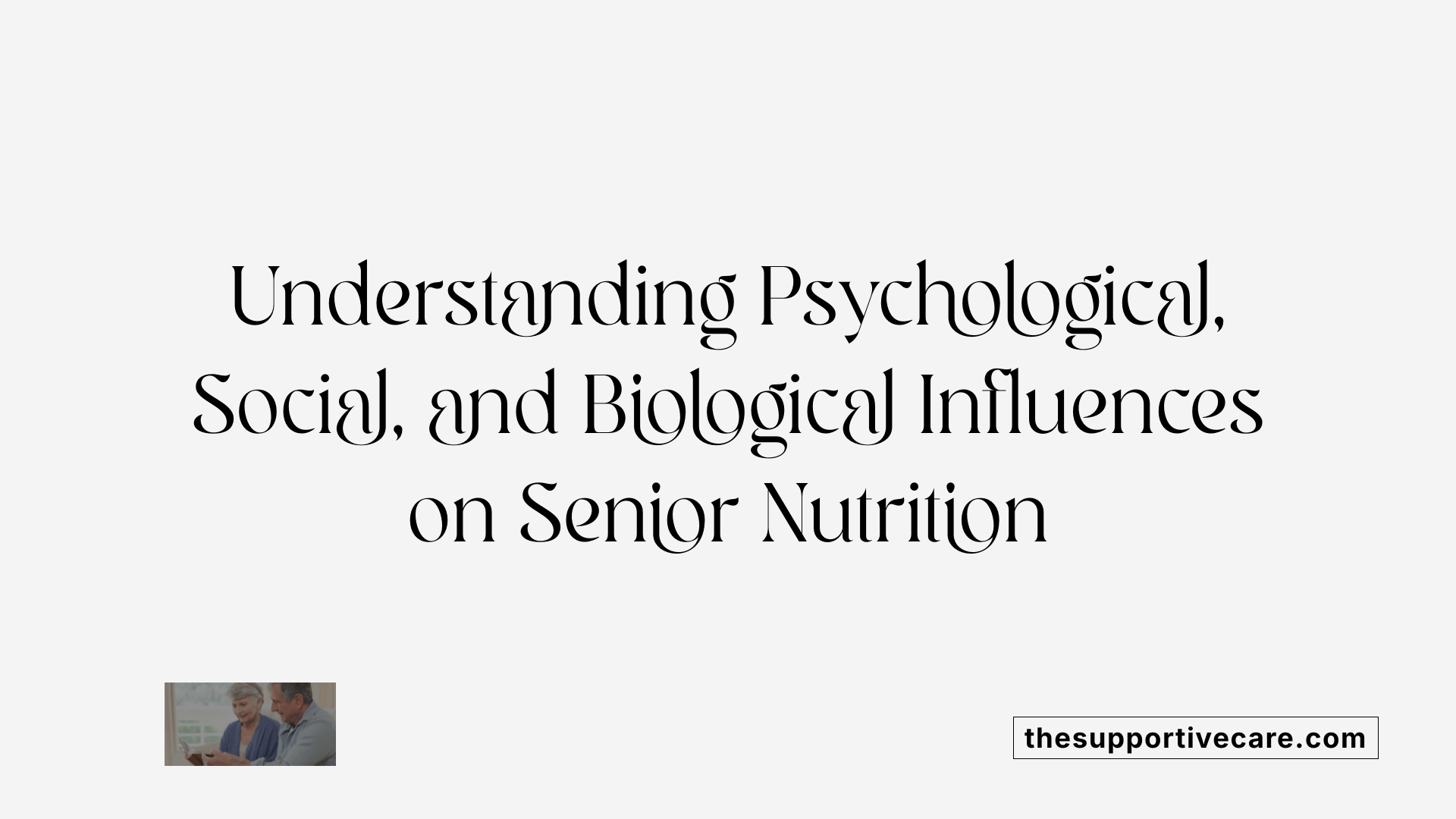
How do psychological, social, and biological factors influence eating behaviors in seniors?
Eating behaviors among older adults are shaped by a complex interplay of psychological, social, and biological influences. Understanding these factors can help in developing strategies to promote better nutrition and overall health in this population.
Psychologically, mental health conditions such as depression and mood disorders significantly impact appetite. Studies show a strong correlation between depression and poor nutritional intake, with malnutrition being common among seniors suffering from mood disturbances. Symptoms like irritability, anxiety, and depression can lead to reduced interest in eating, physiologic anorexia of aging, and subsequent weight loss.
Mood and attitudes toward food are crucial as they influence motivation to eat. Seniors experiencing depression may not only have diminished appetites but may also find less enjoyment in meals, further worsening nutritional status. Studies highlight that a higher score on depression scales correlates with worsened nutritional status, creating a cycle of declining health.
Social factors also play an essential role in seniors’ eating habits. Social isolation and loneliness, prevalent among older adults living alone or with limited social networks, are linked to decreased food intake and poor self-reported health. Engaging in social activities, such as community programs or group meals, has shown to improve appetite and dietary diversity. Social facilitation during mealtimes and participation in geriatric clubs can provide emotional support and boost motivation to eat.
Environmentally, availability of community resources, household composition, and policies influence access to nutritious foods. Food insecurity affects over 2.9 million households with seniors, leading to lower intake of calories, proteins, and essential micronutrients. Food programs like SNAP and community meal services have proved effective in alleviating food insecurity, promoting better nutrition.
Biological changes are inherent to aging and directly affect eating behaviors. These include slowed gastric emptying, decreased taste and smell sensitivities, and hormonal shifts that alter hunger and satiety signals. For example, declines in ghrelin, leptin, and other regulatory hormones can reduce appetite. Neurological conditions such as dementia, Parkinson’s disease, and stroke further impair the recognition and processing of hunger cues.
Moreover, aging often leads to a decrease in metabolic rate, which influences energy needs and consumption. The reduction in sensory perceptions makes food less appealing, often resulting in lower food intake. Dietary modifications, tailored interventions, and providing familiar, nutrient-dense foods are recommended strategies to counteract these effects.
In summary, a combination of psychological health, social engagement, and biological changes influences how older adults eat. Addressing these factors holistically is vital for improving nutrition and health outcomes in senior populations.
| Factor Type | Influence on Eating Behavior | Additional Details |
|---|---|---|
| Psychological | Depression reduces appetite | Higher depression scores linked with malnutrition; mood disorders impact motivation and food enjoyment |
| Social | Loneliness decreases food intake | Social participation enhances appetite; community meals promote dietary diversity |
| Biological | Sensory decline and hormonal shifts | decreases in taste, smell, ghrelin, leptin; neurological conditions impair recognition of hunger |
| Environmental | Food insecurity limits access | Food programs improve dietary intake; household composition influences meal regularity |
| Personality & Awareness | Conscientiousness & health consciousness | Education and family environment shape attitudes towards nutrition |
Understanding these factors enables caregivers and healthcare providers to create supportive environments that encourage proper nutrition, foster social inclusion, and address physiological changes, ultimately supporting healthier aging.
The Bidirectional Relationship Between Mental Health and Nutrition
What is the relationship between mental health issues like depression and anxiety and nutritional health in the elderly?
Mental health and nutrition in older adults are deeply interconnected, influencing each other in complex ways.
Research indicates a bidirectional relationship — poor nutrition can contribute to the onset or worsening of mental health issues like depression and anxiety, while these mental health conditions can also impair nutritional intake.
Nutritional deficiencies, such as lacking vitamins B6, B12, folic acid, zinc, and omega-3 fatty acids, have been linked to increased risk of depression and cognitive decline. These nutrients are vital for neurotransmitter synthesis, brain cell integrity, and reducing inflammation.
Conversely, depression and anxiety often reduce appetite and interest in eating, leading to weight loss and nutritional deficiencies. Symptoms such as fatigue, low mood, and social withdrawal can make it harder for older adults to maintain proper dietary habits.
Dietary patterns notably influence mental health outcomes. Diets high in refined sugars, saturated fats, and processed foods tend to promote inflammation, which is associated with increased depression risk.
In contrast, healthy diets like the Mediterranean and Japanese diets, rich in fruits, vegetables, fish, whole grains, and healthy fats, have been associated with better mental health, lower depression rates, and improved cognitive function.
Studies observe that adherence to such diets provides anti-inflammatory benefits, supplying neuroprotective nutrients that support neurotransmitter production and brain resilience. Moreover, these diets enhance gut health by fostering beneficial microbiomes, which influence mood and stress responses through the gut-brain axis.
Interventions combining dietary improvements with resistance training and social engagement can lead to better sleep quality and reduced inflammatory markers, further contributing to mental well-being.
Therefore, addressing both dietary habits and mental health conditions simultaneously is crucial. This integrated approach can mitigate the progression of depression, enhance cognitive function, and promote overall health.
In summary, the link between mental health and nutrition underscores the importance of comprehensive strategies that include nutritional counseling, lifestyle modifications, and mental health support to improve quality of life among older adults.
| Factors | Impact on Mental Health | Additional Details |
|---|---|---|
| Nutritional Deficiencies | Increase depression and cognitive decline | B vitamins, omega-3 fats, zinc, vitamin D |
| Dietary Patterns | Influence inflammation and mood | Mediterranean diet reduces depression risk |
| Gut Microbiome | Affects neurotransmitter production | High fiber, fermented foods promote benefits |
| Inflammation | Associated with depression and anxiety | Saturated fats and refined sugars worsen inflammation |
| Lifestyle Interventions | Improve sleep and reduce inflammation | Resistance training combined with diet |
Understanding these connections provides a foundation for developing effective interventions that promote mental health through nutritional strategies in older adults.
Mechanisms of How Behavioral Health Problems Affect Eating in Seniors
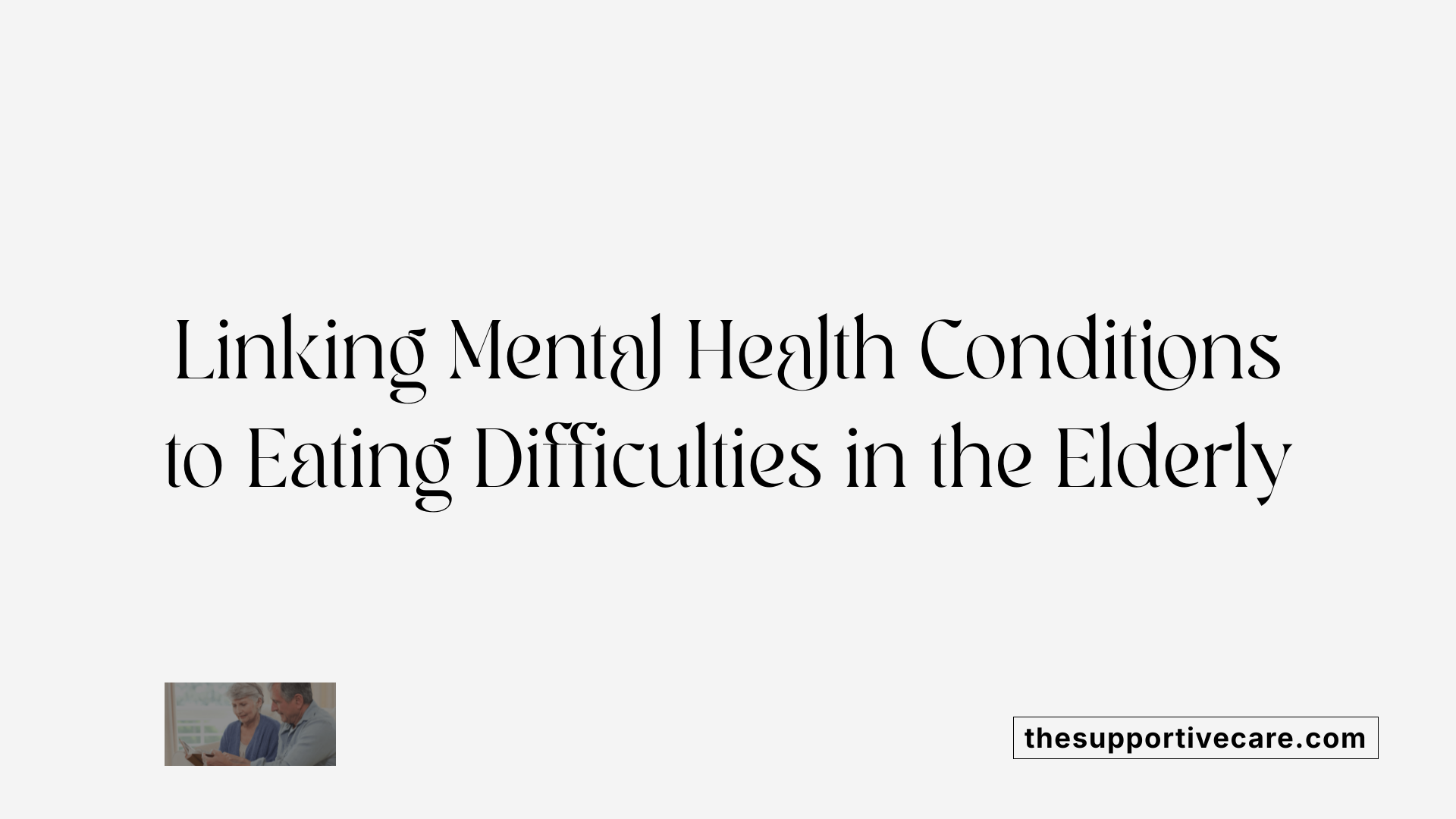
How can behavioral health problems like depression and dementia lead to eating disturbances in the elderly?
Behavioral health conditions such as depression and dementia significantly affect eating behaviors in older adults through various mechanisms. Depression often diminishes motivation and interest in food, leading to decreased appetite, food refusal, and unintended weight loss. Mood disturbances can interfere with meal initiation and meal enjoyment, further contributing to poor nutrition.
Dementia, including Alzheimer's disease and frontotemporal dementia, impacts cognitive processes necessary for planning, recognizing, and executing eating behaviors. As dementia progresses, individuals may forget to eat, have difficulty recognizing food, or experience problems with swallowing—known as dysphagia. These challenges create disorganized eating patterns and increase the risk of food refusal.
Physiological changes associated with aging, such as decreased taste and smell sensitivity, slowed gastrointestinal motility, and altered hormonal regulation of hunger and satiety, compound these behavioral effects. For example, diminishing taste and smell reduce food flavor, making eating less appealing and leading to reduced intake.
Psychosocial factors also play a role; social isolation, loneliness, and chronic health conditions can diminish the desire to eat or lead to erratic eating habits. The cumulative impact of these mental, physiological, and social factors can cause significant nutritional deficiencies, weight loss, and increased vulnerability to disease.
Early assessment using tools like the Mini Nutritional Assessment (MNA) and behavioral questionnaires helps identify individuals at risk. Addressing these factors with tailored nutritional strategies, social engagement, and medical interventions is vital to prevent malnutrition, support mental health, and improve overall quality of life for seniors.
Assessment Tools and Intervention Strategies for Managing Nutritional Risks in Mentally Impaired Older Adults
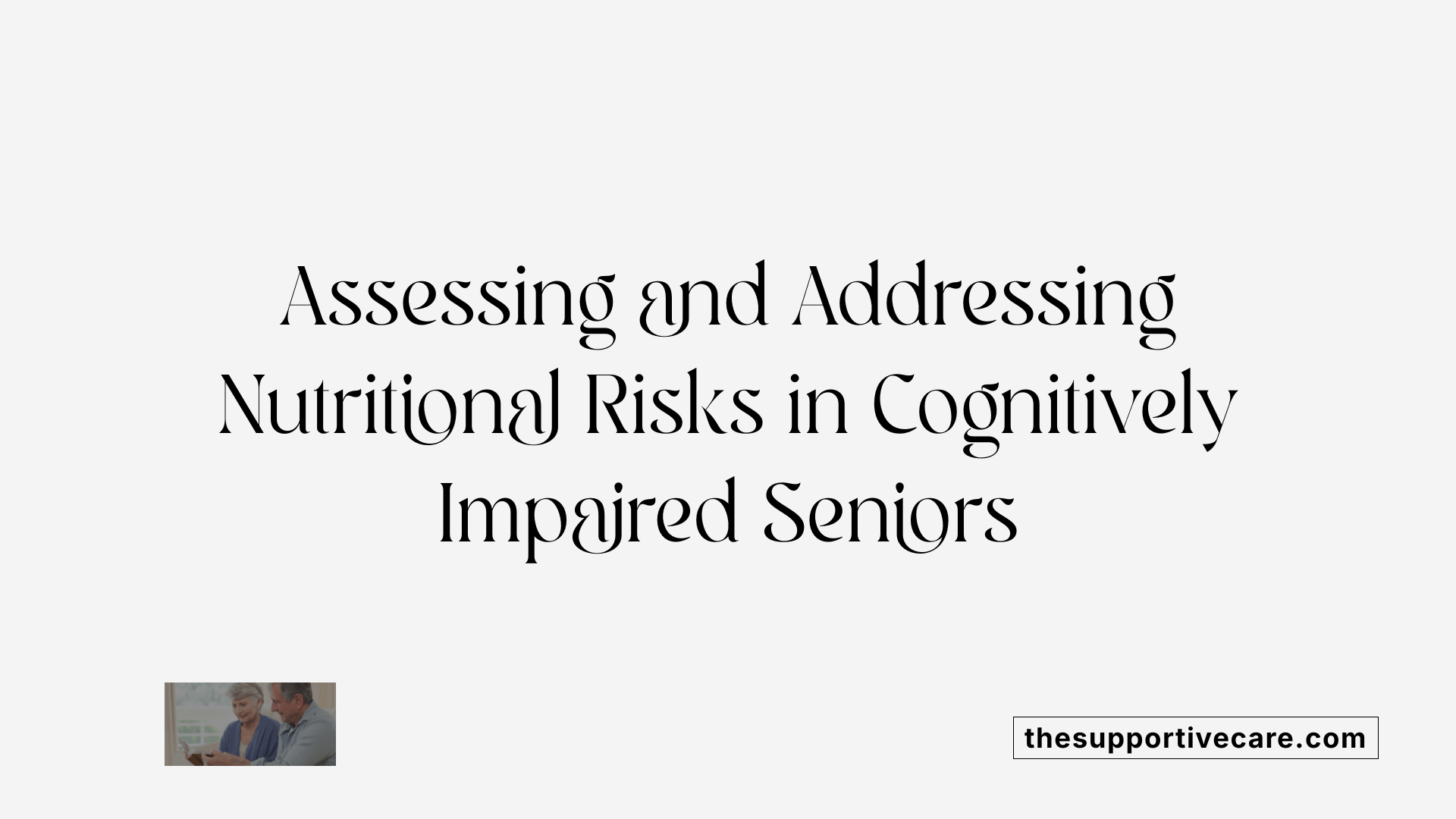
What assessment methods and interventions are effective for behavioral health-related nutritional issues in older adults?
Proper assessment and tailored interventions are vital for managing nutritional health in older adults experiencing cognitive decline or mental health challenges. Several standardized tools are employed by healthcare professionals to evaluate nutritional status and eating behaviors.
Among these, the Mini Nutritional Assessment (MNA) is widely used for initial screening, providing insights into malnutrition risk and guiding subsequent management. The Simplified Nutritional Appetite Questionnaire (SNAQ) assesses appetite levels and potential risk of weight loss. The Eating Behavior Scale (EBS) helps identify problematic eating patterns, while the Appetite and Eating Habits Questionnaire (APEHQ) evaluates specific behavioral factors influencing food intake. For those with dementia or behavioral disturbances, the Cambridge Behavioral Inventory (CBI) provides detailed behavioral profiling.
Early identification of malnutrition or risk factors through these tools enables healthcare providers to develop targeted interventions. Tailored dietary plans, involving nutrient-rich foods and appropriate supplements, are crucial to meet individual needs.
Multidisciplinary approaches are essential for effective management. Teams including nurses, physicians, dietitians, speech therapists, and social workers collaborate to address complex feeding difficulties, ensuring comprehensive care.
Environmental modifications also play a significant role. Adjustments such as serving familiar foods in routine settings, creating a calm dining atmosphere, and involving caregivers in meal preparation can enhance food intake.
Caregiver training on techniques like slow feeding, appropriate portion sizes, and recognizing signs of discomfort or choking helps improve safety and nutrition. Implementing these strategies can improve quality of life, prevent adverse health outcomes, and sustain functional abilities in older adults with cognitive or behavioral issues.
In summary, the combination of robust assessment tools, a multidisciplinary team, and supportive environmental modifications provides a comprehensive approach to managing nutritional risks related to behavioral health conditions in elderly populations.
The Role of Social Support and Community Engagement in Improving Appetite and Nutrition
How do community programs like Lunch on Wheels and geriatric clubs support elderly nutrition?
Community programs such as Lunch on Wheels and geriatric clubs play a significant role in enhancing the nutritional health of older adults. These initiatives provide regular access to nutritious, balanced meals, often designed with seniors' specific dietary needs in mind. Moreover, they foster a sense of routine and stability, which helps reduce confusion and promotes better food intake.
Participating in group meals and social gatherings not only ensures consistent nutrition but also encourages social interaction, which is vital for emotional well-being. Meals served in familiar settings or during structured activities tend to stimulate appetite and make eating a more enjoyable experience for seniors.
Additionally, such programs often include educational components about healthy eating habits and facilitate connections with healthcare providers or nutrition specialists when needed. This comprehensive support can lead to improved nutritional status, reduced risk of malnutrition, and a greater sense of community belonging.
What are the benefits of social participation on mental health and dietary habits?
Engagement in social activities has been shown to positively influence both mental health and eating behaviors in older adults. Regular social interaction can decrease feelings of loneliness and depression, which are common among seniors. These psychological benefits are directly linked to improved appetite and motivated food intake.
Social participation also encourages routine and accountability. When seniors eat with others or participate in community meals, they are more likely to maintain consistent eating patterns, choose healthier foods, and consume adequate portions. Some studies suggest that social dining experiences increase the enjoyment of meals, leading to better nutrient consumption.
Furthermore, active involvement in community events can increase physical activity levels and cognitive engagement, both of which indirectly support better nutritional choices and overall health.
How does social isolation and loneliness affect elderly nutrition?
Social isolation and loneliness are critical barriers to proper nutrition among older adults. These psychosocial challenges often lead to decreased appetite, irregular eating patterns, and reduced interest in food. Eating alone can diminish the pleasure of meals, resulting in lower food intake and nutrient absorption.
Loneliness has also been linked to heightened risks of depression and anxiety—conditions that further impair appetite and motivation to eat well. Additionally, isolated seniors may lack support to prepare healthy meals or seek medical advice, further exacerbating nutritional deficiencies.
Physiologically, social isolation can increase stress levels and inflammation, negatively impacting digestion and metabolic health. As a result, older adults experiencing loneliness are at greater risk of weight loss, malnutrition, and associated health complications like cognitive decline and chronic diseases.
Addressing these issues involves encouraging social participation, establishing community networks, and creating welcoming environments where seniors feel valued and connected.
| Aspect | Impact | Supporting Details |
|---|---|---|
| Community Programs | Improve access to nutritious meals, foster social bonds | Lunch on Wheels, geriatric clubs, group meals |
| Social Participation | Enhance mental well-being, promote healthy eating | Reduces loneliness, increases meal enjoyment |
| Social Isolation/Loneliness | Contributes to decreased appetite, malnutrition | Linked with depression, cognitive decline |
Research continuously highlights how social relationships significantly shape dietary behaviors and mental health outcomes among elderly populations. Promoting community engagement and reducing loneliness are essential strategies to improve their nutritional status and overall well-being.
Addressing Food Insecurity and Socioeconomic Barriers to Optimal Nutrition
How can behavioral health problems like depression and dementia lead to eating disturbances in the elderly?
Behavioral health issues such as depression and dementia significantly impact an older adult's ability to maintain proper nutrition by disturbing normal eating patterns. Depression often results in a decreased desire to eat, loss of appetite, or refusal to consume sufficient food, which can lead to weight loss and nutritional deficiencies. On the other hand, dementia—particularly Alzheimer's disease and frontotemporal dementia—can cause changes in food preferences, reduce the recognition of hunger, and impair the physical ability to chew and swallow.
Aging naturally brings physiological changes that further complicate eating, including a decline in taste, smell, gastrointestinal function, and hormonal regulation of appetite. These changes reduce the pleasure derived from eating and can prompt food avoidance. Additionally, social factors such as social isolation and chronic illnesses play a role, often leading to disorganized eating habits or decreased food intake.
Early assessment of these symptoms using various tools like the Mini Nutritional Assessment (MNA) or behavioral inventories becomes essential. Recognizing the signs of eating disturbances early allows healthcare providers and caregivers to implement targeted interventions, such as dietary modifications, manageable meal routines, and social engagement activities. Addressing both behavioral health and physiological contributors can prevent malnutrition, support cognitive health, and improve overall well-being in older adults.
What is the prevalence of food insecurity among older adults?
Food insecurity remains a pressing issue among the elderly population. In 2018, over 2.9 million households with at least one adult aged 65 or older experienced food insecurity. This situation arises from multiple interconnected factors, including limited financial resources, physical disabilities, chronic diseases, and social isolation.
Older adults facing food insecurity often have to cope with inadequate calorie and nutrient intake, leading to malnutrition and increased health risks. The problem is compounded for those with limited mobility or residing in food deserts, where access to fresh and healthy foods is scarce.
Research indicates that food-insecure seniors tend to consume fewer essential nutrients, including proteins, vitamins, and minerals, heightening their vulnerability to illnesses and cognitive decline. They are also at a higher risk for mental health issues like depression and anxiety, which further diminish appetite and food intake.
How do federal nutrition programs help improve nutritional status?
Federal programs like the Supplemental Nutrition Assistance Program (SNAP), the Congregate Nutrition Program, and the Home-Delivered Nutrition Program play vital roles in combating food insecurity among older adults. These initiatives aim to ensure access to nutritious foods and promote social engagement.
SNAP provides financial support, enabling seniors to purchase a variety of healthy foods, which directly improves dietary quality. Evidence shows that increased SNAP participation correlates with reduced food insecurity, better nutritional intake, and lower healthcare costs.
The Congregate Nutrition Program offers meal services at community centers, fostering social interaction and reducing isolation. It also provides balanced, nutrient-rich meals tailored to the needs of older adults.
For homebound seniors or those with mobility limitations, the Home-Delivered Nutrition Program supplies nutritious meals directly to their homes. These meals help maintain health, prevent malnutrition, and delay institutionalization.
Together, these programs not only enhance nutritional status and physical health but also promote mental and social well-being, critical factors for aging successfully.
| Aspect | Description | Relevant Impact |
|---|---|---|
| Food insecurity prevalence | 2.9 million households with adults ≥65 affected in 2018 | Risk of malnutrition, depression, cognitive decline |
| Impact on health | Poor diet, nutritional deficiencies, increased morbidity | Higher hospitalizations and healthcare costs |
| Federal nutrition programs | SNAP, congregate meals, home-delivered services | Improve diet quality, reduce social isolation, support independence |
Additional Insights
Addressing socioeconomic and behavioral factors is crucial for advancing elderly nutrition. Interventions should include routine screening for depression, cognitive impairment, and nutritional risk, coupled with tailored dietary strategies and social programs.
Promoting awareness of available government support and facilitating access to affordable, nutritious foods can significantly reduce the burden of food insecurity. Moreover, integrating multidisciplinary approaches involving dietitians, social workers, and healthcare providers enhances the effectiveness of interventions.
Ultimately, improving nutrition among older adults necessitates a comprehensive understanding of their unique physiological, psychological, and social needs, along with community and policy support.
This overview underscores the importance of targeted strategies to combat food insecurity and promote healthy aging by ensuring adequate, nutritious food intake. Continued policy efforts and community engagement are essential to protect vulnerable senior populations from the multifaceted impacts of inadequate nutrition.
Structural Changes in Aging and Their Impact on Nutritional Intake
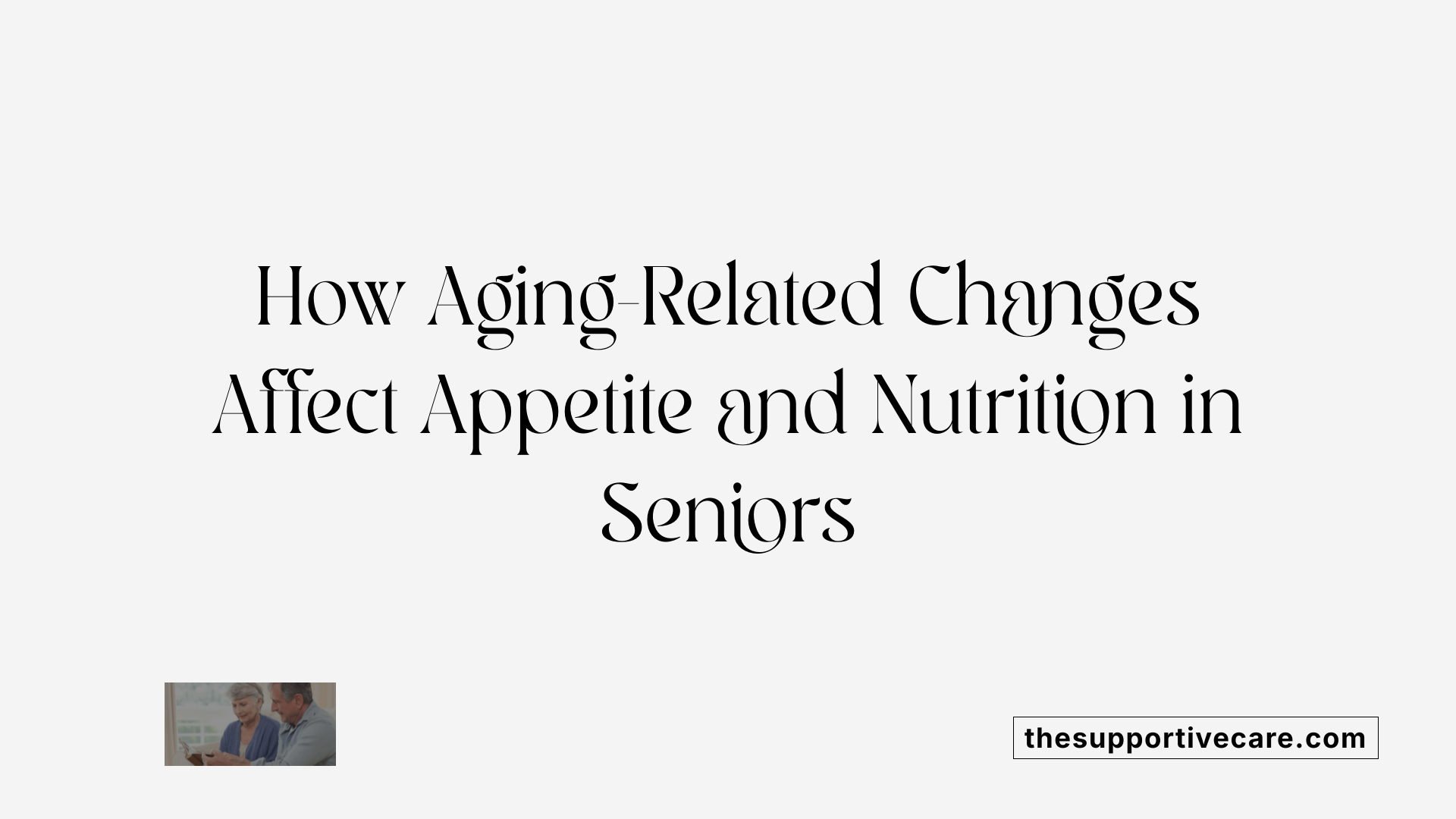
How does behavioral health impact nutrition and appetite in older adults?
Behavioral health issues such as depression, anxiety, and cognitive impairment play a significant role in influencing the nutrition and appetite of older adults. Depression, a common mental health concern among seniors, affects over 45% of this population, leading to decreased motivation to eat and poor dietary intake.
Cognitive decline, including conditions like dementia, affects more than 80% of elderly individuals. This decline impairs memory and judgment, often resulting in loss of interest in eating, irregular eating habits, and difficulty recognizing or preparing food.
Studies have shown that malnutrition prevalence is remarkably high among cognitively impaired older adults, with rates reaching up to 96.7%. These mental health conditions contribute to physiologic anorexia, which diminishes macro- and micro-nutrient intake, exacerbating health problems.
Living arrangements and social factors also impact nutritional status. Older adults living alone or without a caregiver face higher risks of inadequate nutrition due to isolation and diminished support. Conversely, those living at home with higher education levels tend to have better nutritional outcomes, partly because of increased awareness and social engagement.
The interconnectedness of mental health and nutrition creates a cycle—poor mental health can lead to reduced food intake, which in turn worsens mental health, perpetuating malnutrition. Recognizing and addressing behavioral health issues are vital steps in maintaining adequate nutrition, preventing aggressive weight loss, and improving overall well-being in older adults.
Impact of aging on nutritional intake and mental health
Aging induces various physiological, psychological, and social changes that affect nutritional intake and mental health. The decline in sensory taste and smell diminishes the pleasure derived from eating, making meals less appealing and reducing overall intake.
Hormonal changes can alter hunger cues, while gastrointestinal changes—such as decreased gastric emptying and enzyme production—affect digestion and nutrient absorption.
Additionally, reduced physical activity levels slow down the metabolic rate, leading to decreased energy requirements but also reducing the capacity to maintain muscle mass and immune function.
These changes significantly influence the dietary choices and nutritional status of older adults. For example, decreased sensory functions and hormonal shifts can cause a decline in appetite and interest in food.
Moreover, the interplay between nutrition and mental health is evident through several mechanisms. A diet rich in nutrients like omega-3 fatty acids, B vitamins, and antioxidants promotes brain health and mood stability. Conversely, poor diet quality can increase inflammation and oxidative stress, contributing to depression, cognitive decline, and other mental health issues.
The gut-brain axis also plays a crucial role. A healthy microbiome, supported by fiber-rich foods, influences neurotransmitter production, including serotonin, which helps regulate mood and appetite.
In summary, the physical and psychological transformations associated with aging impact eating behaviors and nutritional intake. Ensuring adequate nutrition involves not only addressing physical changes but also supporting mental health through diet, social activities, and mental health care.
Influence of reduced activity levels on metabolic rate
The decrease in physical activity commonly seen in older adults results in a lower metabolic rate. This reduction means that seniors require fewer calories to maintain their weight but still need sufficient nutrients for health and functional capacity.
Lower activity levels can also contribute to muscle atrophy, weight gain, and metabolic disorders such as insulin resistance, high blood pressure, and high cholesterol.
Furthermore, decreased activity diminishes energy expenditure, which can discourage some with limited mobility from engaging in social and physical activities that promote appetite and nutritional intake.
Together with physiological changes, these factors create a complex scenario where maintaining balanced energy and nutrient intake becomes challenging. Tailored interventions, including encouraging safe physical activity and nutritional counseling, are essential for preserving health and preventing age-related decline.
Summarizing aging-related changes and their effects on nutrition
| Aspect | Effect | Impact on Nutritional Intake | Mitigation Strategies |
|---|---|---|---|
| Sensory decline (taste, smell) | Decreased enjoyability of meals | Reduced food intake demand | Flavor enhancement, food variety |
| Hormonal changes | Altered hunger and satiety signals | Decreased appetite | Regular mealtimes, nutrient-dense foods |
| Gastrointestinal function | Reduced digestion and absorption | Nutritional deficiencies | Dietary supplementation, balanced diet |
| Activity levels | Lower energy expenditure | Risk of weight gain or loss depending on intake | Safe physical activity programs |
| Psychological factors | Depression, cognitive decline influence eating habits | Reduced motivation and interest in food | Social activities, mental health treatments |
Understanding these changes underscores the importance of comprehensive approaches involving diet, social engagement, and healthcare support in promoting healthy nutrition among the elderly.
Policy, Community, and Caregiver Strategies to Combat Malnutrition in the Elderly

How do nutrition programs like SNAP and congregate meals contribute to addressing malnutrition in older adults?
Government-supported nutrition programs play a crucial role in ensuring older adults have access to adequate and nutritious food. The Supplemental Nutrition Assistance Program (SNAP) provides financial resources to low-income seniors, enabling them to purchase healthy foods such as fruits, vegetables, nuts, and minimally processed options. Increased participation and benefits in SNAP are linked to significant reductions in food insecurity, better dietary intake, and overall improvements in health.
Community-based programs like the Congregate Nutrition Program and the Home-Delivered Nutrition Program offer meals and social engagement opportunities for seniors, especially those who are frail or homebound. These programs do more than provide nutrients; they foster social interaction, which is vital for mental health and eating motivation. Studies have shown that participation in these programs leads to improved dietary quality, reduced risk of malnutrition, and enhanced social well-being.
| Program Name | Primary Benefits | Additional Outcomes |
|---|---|---|
| SNAP | Food purchase assistance, improves diet quality | Reduces food insecurity, healthcare costs |
| Congregate Meals | Provides meals in social settings | Promotes social engagement, delays health decline |
| Home-Delivered Meals | Delivers nutritious meals to homebound seniors | Supports independence, reduces hospitalizations |
These initiatives are integral components of public health strategies aimed at maintaining the nutritional health of the elderly population.
Future Directions in Research and Practice for Elderly Nutrition and Behavioral Health
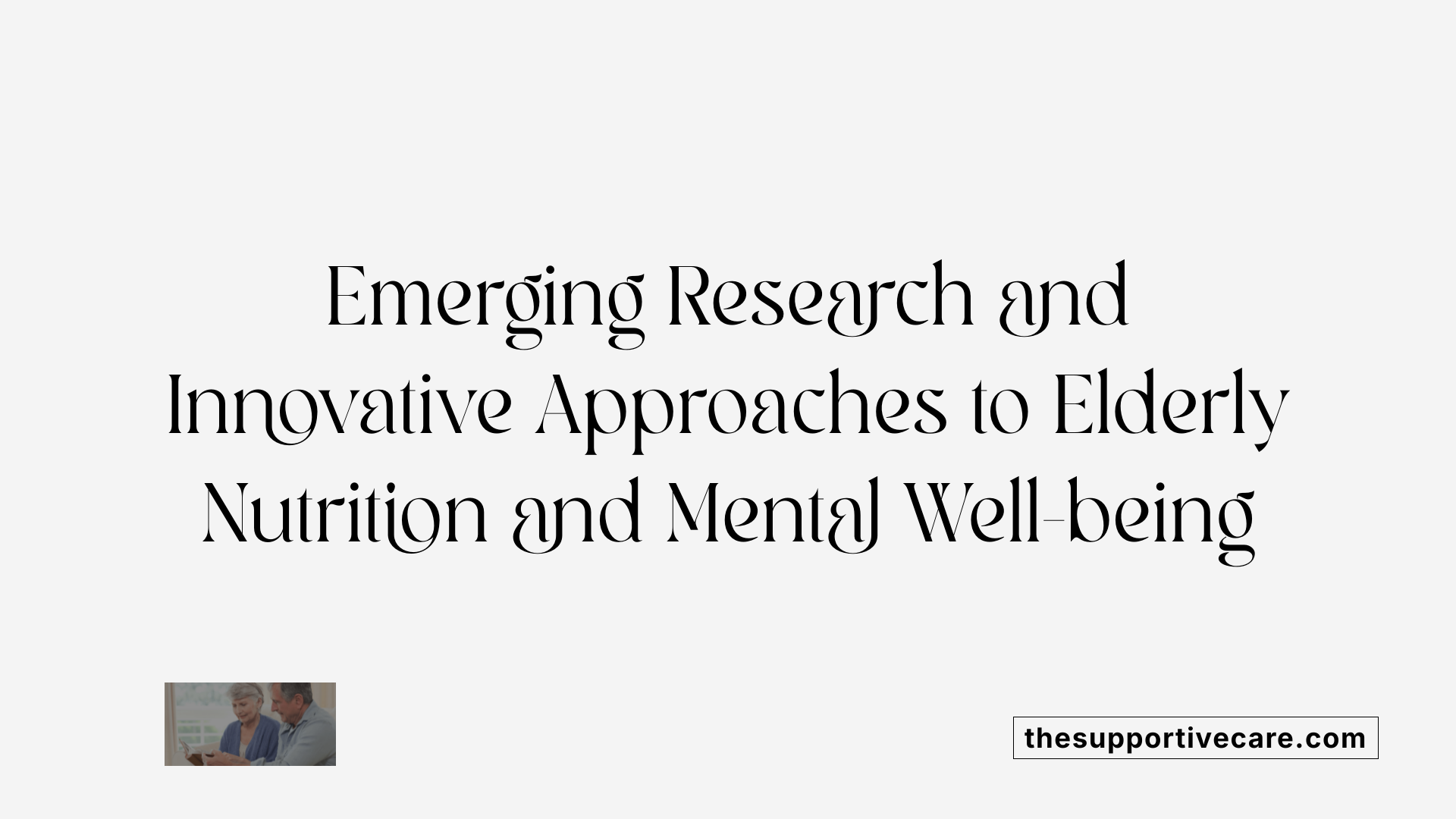
Why is there a need for high-quality intervention studies to better understand elderly nutrition and mental health?
While current research highlights significant associations between diet, psychosocial factors, and mental health issues such as depression and anxiety among older adults, there remains a gap in understanding causality. High-quality, well-powered randomized controlled trials are essential to establish definitive links and mechanisms. Such studies can help determine effective dietary interventions, supplementation strategies, and behavioral modifications to improve mental health outcomes. They also provide evidence needed to inform clinical guidelines and public health policies aimed at optimizing nutrition in aging populations.
How do mechanisms connecting diet, the gut microbiome, and mental health influence aging?
Emerging evidence suggests that the gut-brain axis plays a crucial role in mental health. A healthy gut microbiome contributes to the production of mood-regulating neurotransmitters like serotonin and reduces systemic inflammation, which is linked to depression and cognitive decline. Diet influences the composition and diversity of gut bacteria; fiber-rich, probiotic, and polyphenol-containing foods promote a beneficial microbiome. Conversely, diets high in processed foods, sugars, and saturated fats can promote dysbiosis, leading to increased inflammation and poorer mental health. Understanding these pathways can unlock new nutritional strategies to prevent or treat depression and cognitive impairment in seniors.
What innovative strategies can support nutritional well-being in older adults?
To enhance nutrition and mental health among the elderly, innovative approaches are needed. These may include tailored diet plans emphasizing nutrient-dense, anti-inflammatory foods such as omega-3 fatty acids, fruits, and vegetables. Incorporating community-based programs that foster social engagement through group meals or food-related activities has shown promise in improving appetite and social connection.
Technological solutions, like mobile health apps for monitoring diet and social participation, can provide personalized support. Caregiver training programs that focus on preserving dignity and adapting feeding techniques for those with cognitive decline are also vital. Additionally, integrating dietary counseling into chronic disease management and leveraging federal nutrition programs can address food insecurity, a major barrier to optimal nutrition. These strategies, grounded in ongoing research, aim to build resilient, supportive environments that promote healthy aging.
| Strategy Type | Focus Area | Expected Outcomes | Additional Notes |
|---|---|---|---|
| Dietary Modification | Emphasize nutrient-rich, anti-inflammatory foods | Improved mood, cognitive function, and nutritional status | Including omega-3s, antioxidants, fiber |
| Community Engagement | Group meals, social activities | Enhanced appetite, social support, mental well-being | Programs like Lunch on Wheels |
| Technological Support | Apps, telehealth services | Personalized monitoring and encouragement | Data privacy considerations |
| Caregiver Education | Feeding techniques, dignity preservation | Better intake, reduced resistance to feeding | Special emphasis for dementia care |
| Policy & Program Enhancement | Food security through SNAP, home-delivered meals | Reduced malnutrition and food insecurity | Regular assessments and targeted outreach |
Overall, the integration of scientific insights into practical interventions can significantly improve the nutritional and psychological health of older adults, fostering better quality of life and independence in aging populations.
Promoting Holistic Approaches to Support Elderly Nutrition
Understanding the profound impact of behavioral health on nutrition and appetite in older adults underscores the necessity for integrated strategies that combine mental health support, nutritional counseling, social engagement, and policy initiatives. By addressing psychological, social, and biological factors holistically, caregivers, healthcare professionals, and communities can significantly improve the quality of life and health outcomes for seniors, reducing the prevalence of malnutrition, cognitive decline, and associated health complications.
References
- How Nutrition Affects Mental Health in Older Adults
- How Nutrition Effects Seniors Mental and Physical Health
- Psychosocial factors influencing the eating behaviours of older adults
- Geriatric malnutrition and depression: Evidence from elderly home ...
- Psychological distress in elderly people is associated with diet ...
- Nutritional psychiatry: Your brain on food - Harvard Health
- The Role of Nutrition in Senior Mental Health | Care Indeed



































































































